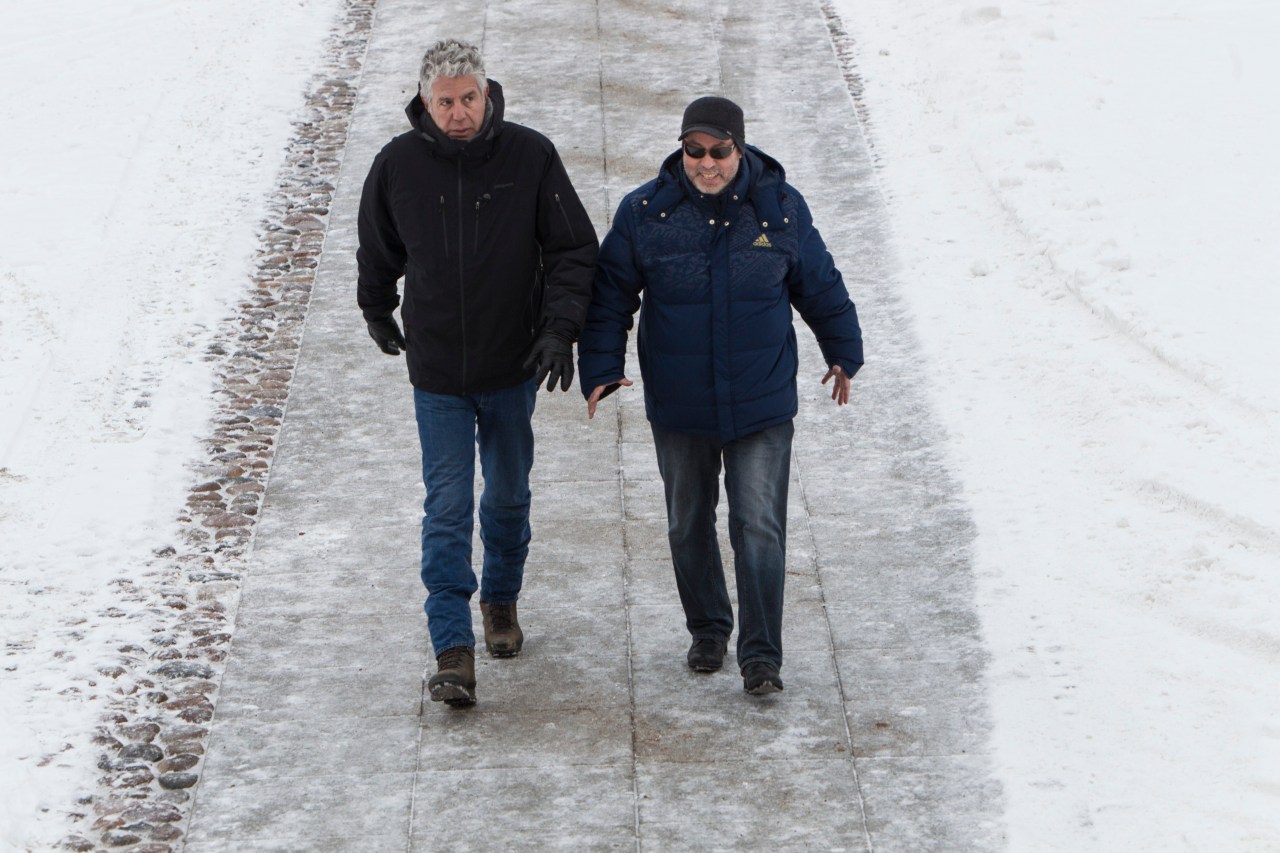Zamir Gotta was working as a fixer for American and British reporters filming in Russia when Anthony Bourdain came to town for his first TV series, A Cook’s Tour, in 2001. Gotta worked with Bourdain’s crew, and a friendship sparked between him and the host that, he says, “changed my life.” Before long, Gotta jumped in front of the camera to teach Bourdain and his audience about Russian culture, and he remained a beloved sidekick on episodes of No Reservations and Parts Unknown. Now a documentary filmmaker, Gotta told Explore Parts Unknown’s Emily Marinoff how his friendship with Bourdain impacted his life and work. “He’s someone who shows you the light,” he said.
Emily Marinoff: How did you and Bourdain first meet?
Zamir Gotta: I was in St. Petersburg and by pure coincidence a friend of a friend told me, “There is a young chef and author whose fixer in St. Petersburg didn’t work out. Would you mind helping them for a day or two?” I said OK without any second thought.
We met in the airport, and he looked like a real hippie kind of guy, you know, with an earring in his ear and some strange rings on his hands. It’s hard to explain—we came from very different worlds, but I just connected to him that first evening when we went out for very primitive Russian food. He pretty openly told me about his past addictions with booze and drugs and that he was insecure on camera.
Marinoff: You knew Bourdain throughout many stages of his career. Did you see him change as he got more used to being in front of the camera?
Gotta: Yes and no. He didn’t change his personality. He was still genuinely hungry and thirsty for more experiences. In different unpredictable environments, like our first freezing-cold day in Russia, he never complained. He never expected people to deliver more than was expected professionally.

Marinoff: Do you think Bourdain’s genuine interactions with guests changed people’s expectations of documentary media?
Gotta: Absolutely. The audience can feel when something is inauthentic. Tony was genuine on camera. He was genuine in life. Tony never wanted to provoke people into something they didn’t want to say. He was always thoughtful about asking certain things.
We met with Boris Nemtsov, the Russian opposition leader, for a Parts Unknown episode in 2014. Tony asked, “Hey, Boris, are you afraid of being as critical of Putin as you are?”
And Boris responded with a smile and said, “Anthony, I’ve watched many of your shows and I know that you have no fear, so why do you expect me to be fearful of anything?” That’s how I learned to separate the real people in my life from bulls**t artists who only know what they want to know and not the information that a documentary needs to have.
To anyone who was sensitive during an interview Tony would say, “Explain it the way you want us to hear.” That reinforced my interest in doing my own documentaries about disenfranchised people in Russia.
That’s the experience that was shared with me on every shoot. I felt like friendship with him really made me a much more determined, honest, and straightforward person and professional.
Marinoff: Can you talk a bit more about how Bourdain affected your own work?
Gotta: I learned from Tony that all people we meet—from different cultures, different countries—are unique. As long as you understand that and want to show it in a genuine way, you have told a story. It’s all about the storytelling.
He urged me to write a book about my transformation from a Soviet English-language teacher to a passionate filmmaker after [the USSR] collapsed. I worked on the book all summer, and thanks to Tony I knew that it should be my voice. It should be a very authentic journey. I know he would be proud of it because I know he’s still looking at me and showing me the way. He always said, “Zamir, be your own man. If you want to do a show, find your story and tell it.”
So that’s my inspiration for this book, and, hopefully, the proceeds will go to the Suicide Prevention Center. That’s another mission I got from Tony, whether he intended it or not.
I got the news [of Bourdain’s death] on the train from Buffalo to New York. I had a bottle of vodka with me, but I didn’t touch it because I realized I really wanted to share it with people who were part of his community. When I arrived in New York, I walked from Grand Central vaguely in the direction of Bourdain’s restaurant, Les Halles, not remembering it was closed. I bumped into another French bistro and I just opened the door, introduced myself, and said, “You probably know what happened.” I ordered food, opened the vodka, and shared it with the staff. I left a half bottle with those people, and I know definitely that the vodka helped those who wanted to share in remembering the love and friendship [Bourdain] created with so many people who never met him personally. He was like a brother to me. The man changed my life.
This conversation has been edited and condensed.